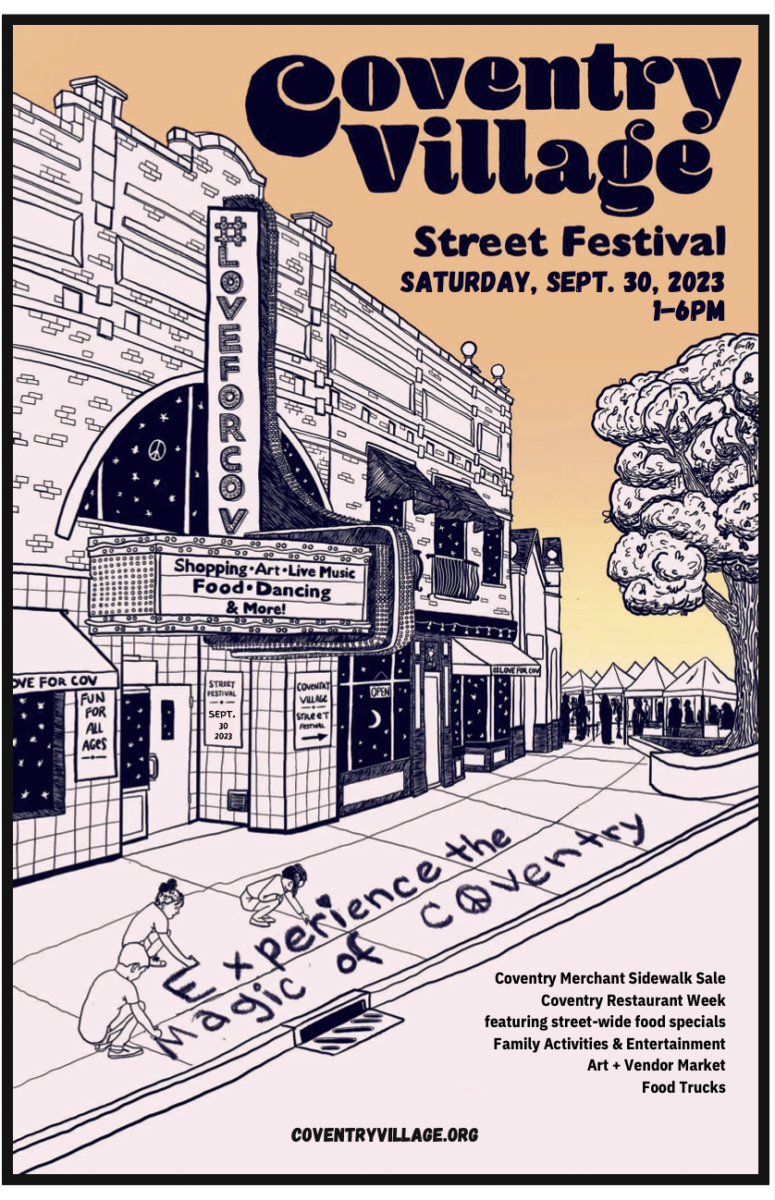On Sept. 30, Coventry Village hosted a street festival, drawing visitors from all around Cleveland, including Case Western Reserve University. The event showcased efforts to implement a revitalization campaign in the wake of COVID-19.
Walking down Coventry Road, various stores hosted pop ups on the sidewalk, local artists were selling their crafts and various free giveaways were taking place. From a local ink printer to the Heights Tropical Sno, the street fair provided ample time for the CWRU community to reconnect with the local area.
Efforts at creating a lively community in Coventry Village are becoming more difficult.
Cleveland Scene reported that one-third of all commercial properties in the area are vacant. This is in combination with competition from other areas of Cleveland, from Tremont and Ohio City to CWRU’s University Circle, which have seen an uptick in investments and visits.
The city had previously spent funding from the American Rescue Plan Act (ARPA) on Coventry Village, having been awarded approximately $39 million from the federal government in 2021.
At the start of August, the Coventry Village Special Improvement District (CVSID) began lobbying for a proposal to allocate $400,000 from the city’s ARPA funds to their district. This was proposed in the run up to a City Council meeting where many business owners made impassioned demands for these funds. Just before their speeches, the council approved a motion from the Mayor of Cleveland Heights Kahlil Seren, declaring the need to create a public works plan for the neighborhood.
“These vacancies impact morale, diminish street traffic and sales and dilute our unique cultural identity,” Mallory Kent, executive director of the CVSID, said in a statement intended for August’s city council meeting.
The discussion surrounded where money to Coventry Village should come from and how much it should be. In September, Kent noted that the city never fully disclosed “how much money is available for allocation.” The CVSID originally requested $60,000 from the ARPA.
The CVSID’s vision was not fully realized. On Sept. 5, Seren introduced his own legislation to give just under $175,000 this calendar year and roughly a similar amount for the next four years, totalling just over $900,000, to the CVSID. Money would not come from the ARPA, but instead from taxes that will be collected by the city in the future. On Sept. 24 it passed unanimously.
“The City of Cleveland Heights is committed to Coventry’s success, and the recent steps we’ve taken—including reauthorizing its Special Improvement District, implementing our Shared Spaces program and reinvigorating our capital investment activities—will help it thrive,” Seren said.
The legislation itself states that this is an “emergency measure necessary for the preservation of the public peace, health and safety of the inhabitants of the City of Cleveland Heights.”
Councilperson Gail Larson mentions how this proposal is set to evolve in the future.
“This legislation is a normal piece that we approve when the Coventry Special Improvement District (SID) asks for an advance on the money that is collected from the property owners in the Coventry Business District,” Larson said. “Council expects to have one more meeting to hear one more time from the Non-profits, like Coventry Village, who are seeking ARPA funds before we finalize our allocation.”
Councilperson Tony Cuda emphasizes the utilitarian nature of the legislation. In his view this is not something special and geared towards Coventry Village, but a procedural matter for the city as a whole.
“What this legislation does is to give the Coventry SID their share of tax dollars up front so they can spend them on the basic needs of the business district [without] having to wait to collect them,” he said. “The actual tax dollars are then paid back to the city once collected. We do this for all SID’s, not just Coventry.”
Cuda said that the City Council is dedicated to helping businesses thrive.
“We do that by allowing our SID’s to get their tax dollars up front to expedite improvements, and more recently, dedicating precious ARPA funds to revitalize Coventry and our other commercial districts.”



